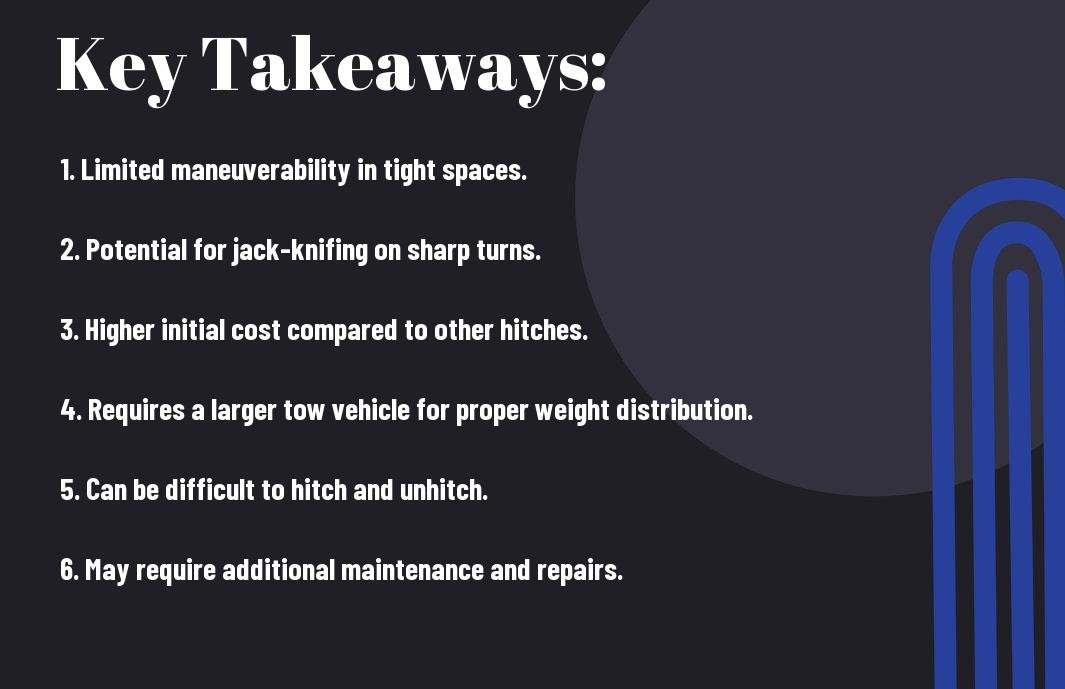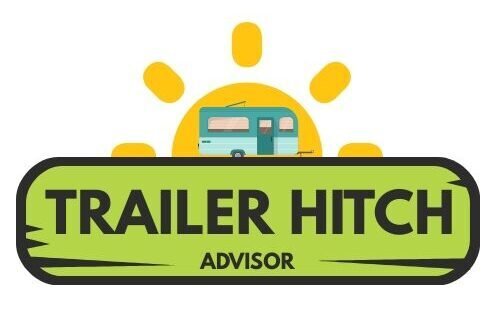Have you ever wondered what disadvantages the fifth wheel hitch may have? While this type of hitch offers superior towing stability and weight distribution, there is one drawback that you should be aware of. The major disadvantage of the fifth wheel hitch is its installation and removal process. Unlike traditional hitches, the fifth wheel requires a dedicated mounting system in the bed of your truck, which can be costly and time-consuming to install. Additionally, once installed, the hitch can be quite heavy and cumbersome to remove when not in use, making it less convenient than other hitch options. It’s important to consider these drawbacks before investing in a fifth wheel hitch for your towing needs.
Key Takeaways:
- Restricted Maneuverability: Fifth wheel hitches can limit the maneuverability of the towing vehicle, making it more challenging to navigate tight spaces or make sharp turns.
- Added Weight: The hitch itself adds additional weight to the towing setup, which can impact fuel efficiency and overall vehicle performance.
- Complex Installation: Installing a fifth wheel hitch can be more complicated and time-consuming compared to other types of hitches, requiring specific tools and expertise.
- Requires Specialized Equipment: In addition to the hitch, a fifth wheel setup often requires a compatible truck bed and mounting system, which can be costly and limit versatility.
- Reduced Cargo Space: The hitch and mounting hardware can take up valuable space in the truck bed, limiting the amount of cargo that can be carried during towing.
- Costly Maintenance: Fifth wheel hitches may require regular maintenance and upkeep, adding to the overall cost of ownership for the towing setup.
- Less Compatibility: Not all vehicles are compatible with fifth wheel hitches, limiting the options for towing with this type of setup.

The Principle of the Fifth Wheel Hitch
One common disadvantage of the fifth wheel hitch is that it can limit the amount of space in the truck bed. This can be a significant drawback if you frequently need to carry large items in your truck bed, such as tools, equipment, or other cargo.
Design and Functionality
The fifth wheel hitch is designed to provide a secure connection between your truck and a large trailer or recreational vehicle. It typically consists of a horseshoe-shaped coupling device that attaches to a special plate mounted in the bed of your truck. The functionality of this hitch allows for a smooth and stable towing experience, especially when hauling heavy loads.
The Role in Vehicle Towing
When it comes to towing, the fifth wheel hitch plays a crucial role in providing stability and control. Its design allows for a more secure and balanced connection between the truck and the trailer, which can result in a safer towing experience overall.
In conclusion, while the fifth wheel hitch may limit the space in your truck bed, its design and functionality provide secure and stable towing for heavy loads, making it a valuable asset for those who need to regularly tow large trailers or recreational vehicles.
Disadvantages of the Fifth Wheel Hitch
Now, let’s take a closer look at some of the disadvantages of using a fifth wheel hitch for towing your trailer. While this hitch type offers many benefits, it’s important to consider the potential drawbacks as well.
Maneuverability Challenges
One major disadvantage of the fifth wheel hitch is the maneuverability challenges it presents. Due to the location of the hitch in the truck bed, it can be more difficult to navigate tight turns and parking situations. This can be especially problematic in crowded campgrounds or urban areas where space is limited. You may find yourself having to make wider turns and plan your route more carefully to avoid getting stuck in a tricky situation.
Cost Implications
Another potential disadvantage of the fifth wheel hitch is the cost implications. Installing a fifth wheel hitch requires modifications to the truck bed, which can be expensive. In addition to the initial installation cost, you may also need to purchase additional equipment such as a specialized hitch and a capture plate. This can add up to a significant investment, especially if you have a limited budget for towing equipment.
In conclusion, while the fifth wheel hitch offers significant advantages in terms of towing stability and weight capacity, it’s important to consider the potential disadvantages as well. Maneuverability challenges and cost implications are important factors to keep in mind when deciding whether a fifth wheel hitch is the right choice for your towing needs. Whether you prioritize stability, capacity, or convenience, consider these drawbacks carefully as you weigh your options. Ultimately, it is crucial to carefully weigh the pros and cons of the fifth wheel hitch before making a decision for your towing setup.
Comparative Analysis
Not all towing methods are created equal. Below is a comparative analysis of the fifth wheel hitch and other towing methods.
Fifth Wheel vs. Other Towing Methods
When comparing the fifth wheel hitch to other towing methods such as gooseneck hitches or bumper pull hitches, it’s important to consider the stability and maneuverability of each. The fifth wheel hitch offers increased stability and a tighter turning radius compared to other methods, making it a popular choice for larger trailers and heavy loads.
Impact on Vehicle Performance
One disadvantage of the fifth wheel hitch is its impact on vehicle performance. Because of the added weight and the way it distributes the load, your vehicle’s fuel efficiency may decrease when using a fifth wheel hitch. Additionally, you may experience increased wear and tear on your vehicle’s suspension and tires due to the added stress of towing with a fifth wheel hitch.
Mitigating the Disadvantages
After considering the disadvantages of the fifth wheel hitch, it’s important to explore ways to mitigate these drawbacks and make the most of this towing solution. By taking certain steps and utilizing advancements in technology, you can address these issues and enhance the overall performance and safety of your towing setup. Let’s take a closer look at some effective strategies for mitigating the disadvantages of the fifth wheel hitch.
Technological Advancements
With advancements in technology, there are now innovative solutions to address the drawbacks of the fifth wheel hitch. One such advancement is the development of smart” hitch systems that provide real-time data and alerts to ensure optimal towing conditions. These systems can monitor important factors such as weight distribution, trailer sway, and brake functionality, providing you with peace of mind and improved safety while on the road. By integrating these technological advancements into your towing setup, you can effectively mitigate the disadvantages associated with the fifth wheel hitch.
Best Practices for Users
Another effective way to mitigate the disadvantages of the fifth wheel hitch is to adhere to best practices for its usage. This includes carefully following the manufacturer’s guidelines for installation, maintenance, and operation. Additionally, it’s crucial to ensure that your tow vehicle is compatible with the hitch and that you adhere to the specified weight limits and towing capacities. By educating yourself on the best practices for using a fifth wheel hitch and consistently implementing these guidelines, you can significantly reduce the likelihood of encountering the disadvantages associated with this towing solution.
One Disadvantage of the Fifth Wheel Hitch
Taking this into account, one disadvantage of the fifth wheel hitch is its relatively higher cost compared to other types of trailer hitches. The fifth wheel hitch requires a specialized mounting system in the bed of your truck, which can be more expensive to install and may limit the overall use of your truck bed. Additionally, if you have a smaller truck, the weight of the hitch itself may also impact your payload capacity. These factors should be carefully considered when deciding which type of hitch is best for your towing needs.
FAQ
Q: What is one disadvantage of the fifth wheel hitch?
A: One disadvantage of the fifth wheel hitch is that it takes up bed space in the truck, limiting the amount of cargo that can be carried.
Q: Does a fifth wheel hitch affect the maneuverability of the vehicle?
A: Yes, a fifth wheel hitch can affect the maneuverability of the vehicle, especially when driving in tight spaces or making sharp turns.
Q: Are fifth wheel hitches compatible with all types of trucks?
A: No, fifth wheel hitches are not compatible with all types of trucks. They require a specific mounting system and may not be suitable for some trucks.
Q: Is installation of a fifth wheel hitch complicated?
A: The installation of a fifth wheel hitch can be complicated and may require professional assistance to ensure it is properly installed and secure.
Q: Can a fifth wheel hitch affect the stability of the truck?
A: Yes, a fifth wheel hitch can affect the stability of the truck, especially when carrying heavy loads. It is important to ensure that the hitch is properly installed and the truck is balanced to maintain stability.
